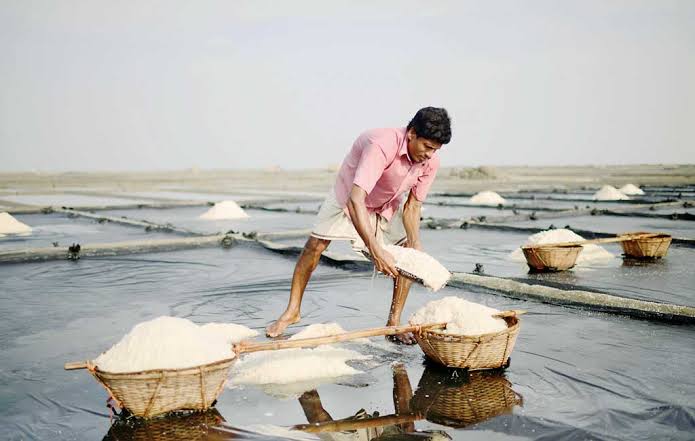SAMI
Published:2020-03-02 05:07:56 BdST
Salt producers seek extra tariff on imports, lifting of restrictions
FT ONLINE
To protect the domestic salt industry, the local salt producers have demanded raising the tariff on imported salt.
They also demanded that local salt mill owners be allowed to import the ingredient.
Salt producers made the demands at a public hearing "Challenges to and Solutions for Salt Farming or Refining Industry" organised by the Bangladesh Trade and Tariff Commission on Sunday.
Representatives of the Tariff Commission, Ministry of Industries, Bangladesh Small and Cottage Industries Corporation (BSCIC), salt farmers, Bangladesh Salt Mill Owners Association, and salt refiners were present at the hearing.
At the programme, the commission's Assistant Chief Md Mahmodul Hasan presented a report on the sector.
The report said that The National Salt Policy 2016 allows the use of sodium chloride as raw material for producing some chemical items.
"By importing extra salt with the tax relief, importers have created an unequal competition with domestic salt refiners," said Mahmodul Hasan.
According to his report, the cost of salt imported with a 31 percent tariff is Tk5.89 per kg, while the cost of the one produced by the local farmers is Tk6.73. So, the local salt mill owners and refiners are now under pressure.
President of Bangladesh Salt Mills Owners Association Md Nurul Kabir said, "Local salt farmers, refiners, and industries that use salt as raw material should be protected with an increased tariff on salt import.
"At the same time, the salt millers should be allowed to import salt."
ACI Salt Ltd's Business Director Kamrul Hassan said, "When locally produced salt is refined, a maximum of 550 kg can be collected from 1 tonne, whereas 820 kg can be collected from the Indian-produced salt. Because of this gap, the salt production cost goes up."
The participants at the hearing said that sodium sulphate import remains low in the country during the salt production season. July to December is the off-season for salt production. But this is the time when sodium sulphate import increases.
The price of sodium chloride and sodium sulphate in the global market is the same, and these two ingredients cannot easily be separated as they look almost the same.
Different industries import sodium chloride or edible salt – with the declaration for sodium sulphate – which they then sell as edible salt. But sodium chloride does not meet the requirements because it is not iodised.
The companies producing salt in the most modern way are selling it for Tk35 per kg. However, imported salt is being sold for Tk15-20 per kg.
Some corrupt salt millers, including Kashipur Salt Industry, Shah Madina, New Quality, and Shapta Dinga of Narayanganj are also selling such salt, according to the BSCIC, which found them selling industrial salt as edible salt, thereby harming consumers and taking the market share of local producers.
There is no accurate estimate of the amount of salt produced in the country, and the sector-specific demand for it. The commission recommended measuring this demand through fast research.
Its Chairman Tapan Kanti Ghosh said if demand can be determined, the level of production and import can be matched.
The commission will advise the Ministry of Commerce to find out why salt farmers' participation in public hearings has decreased and why extra money is charged while leasing land for salt production.
Unauthorized use or reproduction of The Finance Today content for commercial purposes is strictly prohibited.


